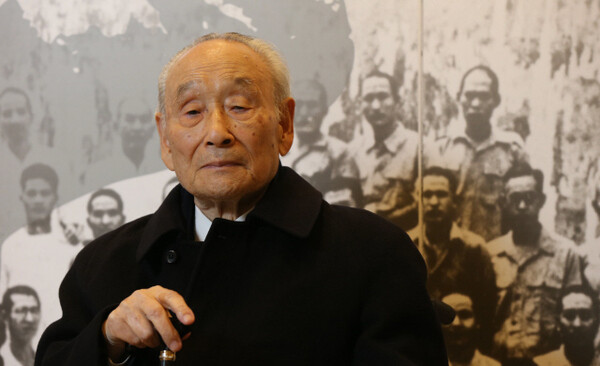hankyoreh
Links to other country sites 다른 나라 사이트 링크
Japanese university students produce documentary on POW camp guard in World War II

Japanese university students produced a documentary on the life of a Korean who was enlisted as a POW camp guard during World War II, only to end up branded a war criminal, the Asahi Shimbun newspaper reported on Jan. 15. Titled “The Hidden Irrationality of Postwar Compensation: The Battle of a Korean Class B/C War Criminal,” the documentary was screened in Tokyo’s Iidabashi district on Jan. 14 by eight third-year students under the direction of Yasushi Suzuki, a professor of intercultural communication at Hosei University, the newspaper said.
After deciding to focus on the Korean Class B/C war crime issue as a school seminar topic, the students made a documentary on the life of 92-year-old Lee Hak-rae, who formed the group Dongjinhoe to address the issue. Lee has been working to demand an apology and compensation from the Japanese government.
After the end of World War II, the Allied Powers classified German and Japanese war criminals into the three classes of A, B, and C. Class A war criminals were those responsible for planning and initiating or carrying out wars of aggression, while Class B and C war criminals were those who had committed abuses of POWs and pillaging, as well as acts of torture and murder on orders from superiors.
At issue is that fact that many Koreans were enlisted by the Japanese to serve as POW camp guards during the Pacific War, only to end up facing harsh sentences of death or life imprisonment at the Allies’ postwar international trials. In many cases, Korean guards mobilized as civilian employees of the Japanese military ended up charged with POW abuse because they were in a position to relay the military’s orders. While Japan did establish laws after the war to support soldiers and civilian military employees, the Korean guards were ineligible for benefits, as they had lost their Japanese citizenship.
As a 17-year-old, Lee was sent to serve as a POW guard at a railroad construction site in Thailand. After the war, he received a death sentence. While it was subsequently commuted to 20 years, 11 of which he served, many of his colleagues ended up put to death. Lee was also unable to return to Korea, as he was criticized for role in working with the Japanese military. When the students visited to film the documentary, Lee told them he wanted to “resolve the bitterness of my lost colleagues and restore their reputations.”
The students, who said they were unaware until recently of the term “Class B/C war criminal,” said Lee’s words about acting on behalf of his colleagues “stuck with us,” the newspaper said.
“To be honest, I had wondered before how long Japan had to keep apologizing, but then I realized we cannot turn our eyes away,” one of the students said.
At the documentary’s end, a narrator says, “Just three of the colleagues who have worked with [Lee] remain. As young people, how should we approach an issue that demands swift resolution?”
By Cho Ki-weon, Tokyo correspondent
Please direct questions or comments to [english@hani.co.kr]

Editorial・opinion
![[Column] Season 2 of special prosecutor probe may be coming to Korea soon [Column] Season 2 of special prosecutor probe may be coming to Korea soon](https://flexible.img.hani.co.kr/flexible/normal/500/300/imgdb/original/2024/0426/3317141030699447.jpg) [Column] Season 2 of special prosecutor probe may be coming to Korea soon
[Column] Season 2 of special prosecutor probe may be coming to Korea soon![[Column] Park Geun-hye déjà vu in Yoon Suk-yeol [Column] Park Geun-hye déjà vu in Yoon Suk-yeol](https://flexible.img.hani.co.kr/flexible/normal/500/300/imgdb/original/2024/0424/651713945113788.jpg) [Column] Park Geun-hye déjà vu in Yoon Suk-yeol
[Column] Park Geun-hye déjà vu in Yoon Suk-yeol- [Editorial] New weight of N. Korea’s nuclear threats makes dialogue all the more urgent
- [Guest essay] The real reason Korea’s new right wants to dub Rhee a founding father
- [Column] ‘Choson’: Is it time we start referring to N. Korea in its own terms?
- [Editorial] Japan’s rewriting of history with Korea has gone too far
- [Column] The president’s questionable capacity for dialogue
- [Column] Are chaebol firms just pizza pies for families to divvy up as they please?
- [Column] Has Korea, too, crossed the Rubicon on China?
- [Correspondent’s column] In Japan’s alliance with US, echoes of its past alliances with UK
Most viewed articles
- 1[Column] Season 2 of special prosecutor probe may be coming to Korea soon
- 2‘We must say no’: Seoul defense chief on Korean, USFK involvement in hypothetical Taiwan crisis
- 3Division commander ordered troops to enter raging flood waters before Marine died, survivor says
- 4Is N. Korea threatening to test nukes in response to possible new US-led sanctions body?
- 5Is Japan about to snatch control of Line messenger from Korea’s Naver?
- 6No good, very bad game for Korea puts it out of Olympics for first time since 1988
- 7[Editorial] Korea’s surprise Q1 growth requires objective assessment, not blind fanfare
- 8Korea’s 1.3% growth in Q1 signals ‘textbook’ return to growth, says government
- 9N. Korean delegation’s trip to Iran shows how Pyongyang is leveraging ties with Moscow
- 10Amnesty notes ‘erosion’ of freedom of expression in Korea in annual human rights report